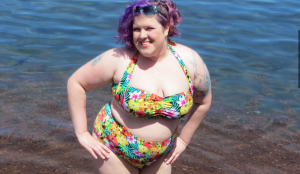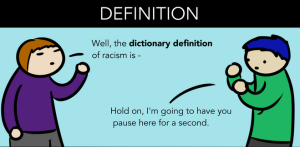
Source: Getty Images
I thought about titling this article “Four Questions about Virginity That I’d Be Happy Never to Answer Again” because, really, that’s how I feel.
As a sex educator, I find that I do a lot less eye-opening education about theory and psychosociology than I do myth-busting misconceptions about basic facts of anatomy and physiology.
And that’s not your fault, general public.
And in point of fact, I really don’t mind answering your questions, whatever they are – even these four! As far as I see it, I’m a one-woman public service provider, and I will do all that it takes to give you what you need.
And sometimes, myth-busting is exactly what you need.
Or – you know – adequate comprehensive, inclusive, pleasure-based sexuality education on a national scale, but I gave up Idealism years ago.
So let me put my Realist hat on to help you navigate through the murky waters of these four myths about virginity.
1. It’s an Actual Thing
Let’s start with the biggest myth of all – that virginity is something quantifiable.
Let’s bust this myth once and for all (and you can trust me on this one): There is no medical or biological definition of virginity.
None. Nothing.
There is no real definition of virginity except for, you know, the one in the dictionary, which defines it as “the state of never having had sexual intercourse.”
But the problem with that definition is that it doesn’t mean anything.
Because “sexual intercourse” refers to penetrative sex.
So what about all of the people who have plenty of sex, but aren’t having penetrative sex? Does this mean that they are forever virgins?
How “far” can you go until what you’re doing is officially S-E-X? Does manual or digital sex count? Oral? What about penetration with a toy?
The truth is: Different people define sex differently. So even the one definition of virginity that we have doesn’t work.
Virginity as a concept was invented as an attempt to control (female) sexuality.
It’s just an idea.
And ideas can change.
2. But Duhh, the Hymen!
Let’s ignore the fact that even asking about the hymen disregards everything that I just said about how virginity has no medical or biological definition.
And let’s ignore the fact that bringing up the hymen as a marker for virginity then assumes that only people with vaginas can be virgins in the first place (oh, hey, what’s up, sexism?).
Let’s even ignore the fact that the whole “cherry popping” myth discounts the fact that sex doesn’t have to be defined as penetrative!
Let’s just address the issue at hand: the hymen.
The hymen – also known as the corona – really isn’t anything to write home about.
It’s actually far less exciting than myth gives it credit for. It’s just a thin membrane located at the opening of the vagina. You can even see it. Seriously. Grab a hand mirror.
That’s right. Contrary to popular belief, it isn’t located inside of the vagina, nor does it cover the vagina.
I mean, let’s just pause for a second to think about this logically.
The average age of first sexual intercourse among American women is 17. The average age of their first experience of menstruation? 12 or 13.
If there were a layer of skin covering the opening of the vagina that couldn’t be “broken” or “popped” until first intercourse, how would young women experience menstruation?
Yeah. Think about it.
And although there are some medical conditions by which the hymen could feasibly cover the opening of the vagina, they’re considered anomalies and necessary to repair by surgery.
3. It Has the Power to Change Your Genitals
Whether you believe that losing your virginity will magically make your penis grow (it won’t) or that too much sex will make a vagina loose (it won’t), I have news for you: Sex isn’t going to change the size or shape of your genitals.
I could pump my arm in and out of a sleeve all day long; it isn’t going to make it any longer.
Similarly, sometimes I eat really huge veggie burgers, and I have to stretch my mouth really wide to get a significant bite. But my lips don’t go all loose and flabby because of it.
The idea that your loss of virginity is such an altering experience that it can cause lasting physical change to your body is really just wrapped up in the social myth that virginity matters – either positively or negatively.
Because isn’t it a funny coincidence (it’s not) that supposedly, when men have sex for the first time, their genitals become more desirable, but when women do it, theirs become more undesirable?
The idea that your state of virginity can somehow impact your genitals is just another sexist construct that tells men to aggressively pursue sex and for women to actively refute it.
And for the record, let me explain the whole “stretching of the vagina” misconception because it is based in some truth:
The vagina is a pathway of muscles.
Like any muscle in your body, if you don’t stretch it, it gets kind of tight. Think of that feeling in your hamstring when you try to do a forward fold after you haven’t in a long time. Holy shit, right?
Well, your vagina is the same way.
Unless you keep stretching and exercising it, it tightens up again. So if you’ve never been penetrated before, or if it’s been awhile since the last time you were penetrated, your vagina is like, “WHOA WHOA WHOA WAIT A SECOND OW.” Just like your hamstring.
And just like any other muscle in your body, it snaps back (eventually) into its natural state when it’s left alone.
That’s why if you’ve never had intercourse before (or if you haven’t in awhile), there is a sensation of “tightness.” And that’s why if you’ve been having sex regularly, there isn’t that same sensation of “tightness.”
But it is in no way a permanent change.
4. It Changes Who You Are As a Person
The myth of purity – the idea that it exists and that it’s significant – is a dangerous one.
Because like so much else in our culture, it posits certain people as “better” than others and in doing so, polices people’s (and particularly women’s) autonomy.
Recently on Tumblr, a young woman wrote to me with the following story:
I’m an 18-year-old woman, and I recently told a couple of my close friends that I’m going to have sex with this guy that I used to date. They told me that they didn’t think it was a good idea and tried to make me doubt my decision because I’m a “virgin” and it “should be special.” Although I do talk to him, it’s most likely only going to be one time! Not “special” at all. Is it really wrong for me to do this?
And that makes me so sad.
It makes me sad that a woman doubts herself and the decisions that she’s making about her life and her body because people who are close to her denounced her.
And over what? Being a murderer? A rapist?
No. Being a woman who wants to have sex for the first time with a friend rather than the Love of Her Life.
Eye roll.
And there’s a reason why this attitude exists. It’s so entrenched into our culture – even I bought into it as a teenager and had a game plan for how my first time was going to be super special – because of the underlying belief that losing your virginity changes you.
And guess what.
It doesn’t.
The first time that I rode a bike didn’t drastically change my life. Neither did the first time I successfully – finally! – made a working apple bread recipe.
And neither did the first time, when I was a young gymnast, that I landed a back handspring – except for the fact that it meant that I could then compete higher level floor routines.
First times are exciting. They’re full of wonder and victory and even a little bit of disappointment – that was it!? – but the effects aren’t long-lasting.
Having sex for the first time is the same way.
It’s something that you do, and it’s really awesome (or terrible), and that’s the end of it. You’re not miraculously changed on the inside.
And as far as I’m concerned, losing your virginity should be met with as much pomp and circumstance (and, ya know, shame) as the others.
There is no “You’ve ridden how many bikes?” There’s no “You’ve made apple bread how many times?” There’s no “Do you know how dangerous gymnastics can be!?” (Okay. There is a little bit of that.)
Similarly, virginity should be of no consequence.
Because it isn’t.
—
When I was a kid, my father taught me that one thing I never wanted to be was “a woman with a reputation.” And although he never specified that he was talking about sex, I knew that he was.
Because virginity, supposedly, is sacred.
But I have news for you: It doesn’t have to be.
All it takes is a little bit of myth-busting, a little bit of education, and we can turn around the conversation about virginity.
So join me. We’re long overdue.
[do_widget id=‘text-101′]
Melissa A. Fabello, Managing Editor of Everyday Feminism, is a domestic violence prevention and sexuality educator, eating disorder and body image activist, and media literacy vlogger based out of Philadelphia. She enjoys rainy days, Jurassic Park, and the occasional Taylor Swift song and can be found on YouTube and Tumblr. She holds a B.S. in English Education from Boston University, an M.Ed. in Human Sexuality from Widener University, and is currently pursuing her Ph.D. She can be reached on Twitter @fyeahmfabello. Read her articles here and book her for speaking engagements here.
Search our 3000+ articles!
Read our articles about:
Our online racial justice training
Used by hundreds of universities, non-profits, and businesses.
Click to learn more




















